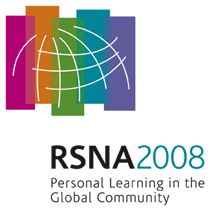
Abstract Archives of the RSNA, 2008
Song-tao Ai, Presenter: Nothing to Disclose
To evaluate the diagnostic value of DCE-MR and MR-DWI in differentiating benign tumors from malignant tumors in the tongue.
DCE-MR and MR-DWI was performed in 46 patients with the neoplasm in the tongue and in 7 healthy people. All the lesions were pathologically proved (13 benign, 33 malignant). The MR signal intensity of the ROI was plotted and the slope value of the time-intensity curve was analyzed. Two apparent diffusion coefficient (ADC) values were obtained from both b values (500 and 1000 s/mm2) in each lesion. Subjective overall performance of two techniques was evaluated with Receiver Operating Characteristic (ROC) anylysis.
①The maximal slope value and the ADC value between normal tongue and tongue masses were significant different. A significant difference was observed in the distribution of TIC type between benign and malignant tumors groups (χ2=21.61, P<0.001). The maximal slope value value was significantly different between benign-malignant groups (mean of benign=38.10±7.74,mean of malignant=46.08±10.40,t=2.253,P=0.016). In diagnosing benign tongue tumors, the maximal slope value with a threshold of 38.6 yielded a sensitivity of 80.3%, a specificity of 74.5%, and an accuracy of 77.9%, a positive predictive value of 89.2%, and a negative predictive value of 60.1%, respectively. The ADC value was significantly different between benign-malignant groups(b=500,mean of benign=1.73×10-3mm2/s, mean of malignant=1.21×10-3mm2/s ,t=4.125,P=0.0001). In diagnosing benign or malignant tongue tumors, an ADC threshold of 143.5×10-5 yielded a sensitivity of 74.6%, a specificity of 83.3%, an accuracy of 79.7%, a positive predictive value of 89.9%, and a negative predictive value of 59.4%, respectively. ③There was no significant difference between the accuracy in diagnosis with DCE-MR and MR-DWI.
①Both DCE-MR and MR-DWI are valuable techniques to distinguish benign from malignant tongue tumors. The accuracy in diagnosis with DCE-MR and MR-DWI was not different. ②MR-DWI is better than DCE-MR in reducing test time and controlling medical cost. ③DCE-MR is better than MR-DWI in revealing the characteristic of blood perfusion in tumors.
We make use of DCE-MR and MR-DWI as valuable techniques to distinguish benign from malignant tongue tumors in clinic.
Ai, S,
The Comparative Research of Dynamic Contrast-enhanced MR Imaging and Diffusion-weighted MR Imaging to Detect Tongue Masses. Radiological Society of North America 2008 Scientific Assembly and Annual Meeting, February 18 - February 20, 2008 ,Chicago IL.
http://archive.rsna.org/2008/6014559.html

